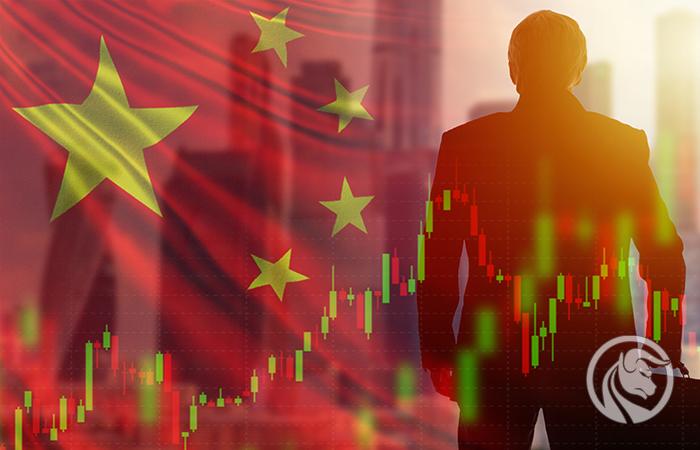China goes into deflation: what does it mean for the global economy?
Worrying trade data from China for July sent European and US markets plummeting, fueling fears that the Chinese economy is struggling. This undermines hopes that the slowdown in QXNUMX was a one-time phenomenon.
Signs of a slowdown in China have been evident for months, given that PPI inflation was negative throughout the year, and CPI inflation followed it with a certain lag.
China deflation: first time in 28 months
In July, China's CPI index went into deflation for the first time in 28 months, raising concerns that despite promises of further stimulus measures, Chinese authorities may run into constraints on the type of stimulus they can use to spur domestic demand.
CPI inflation fell from 0,2% in June to -0,3% in July, while PPI was -4,4%, the tenth month in a row that prices were negative.
Impact of deflation on central banks
China's deflation has been the proverbial elephant in the room with the recent tightening measures from the Federal Reserve, the ECB and the Bank of England. The question is how many more rate hikes can we expect in the coming months as there is a clear deflationary impulse coming from Asia, and where is the tipping point in terms of the risk of excessive tightening.
The recent rebound in oil prices has pushed up gasoline prices as well as marked delays in the effects of earlier interest rate hikes. Does the risk of excessive tightening outweigh the risk of signaling a break and waiting for the effects of earlier interest rate increases on consumers?
Time for inflation from the US and further actions by central banks?
Tomorrow's US CPI data and Friday's PPI data may help to answer this question. However, it is becoming increasingly likely that central banks are more likely to pause in September, meaning we may have already seen the end of the rate hike cycle for all three, Federal Reserve, EBC i Bank of England.
Tight credit conditions for banks were also behind yesterday's sell-off after Italy unexpectedly charged its banking sector a 40% windfall tax on profits this year. This sparked fears that other European countries such as Germany, France and Spain could follow suit.
UK banks also fell although the outlook for UK tax is lower given the UK banking sector is already paying a higher rate due to the 3% bank levy on top of the 25% corporate tax rate although there have been some misguided calls to the UK government to proceed in a similar way as in the case of the levy on energy profits for energy companies. This would be unwise as it could induce banks to cut back on lending and consequently become more cautious about taking risks, which in turn could increase profits as well as limit lending to the real economy.
Summary: deflation in China and the global economy
In short, the situation in China affects the global economy, and deflation could be a signal of more serious problems. Central banks must be careful not to tighten too much and cause undesirable effects, including a deep recession or a deflationary spiral.






















![Forex Club – Tax 9 – Settle tax on a foreign broker [Download the Application] Forex Club - Tax 9](https://forexclub.pl/wp-content/uploads/2024/02/Forex-Club-Podatek-9-184x120.jpg?v=1709046278)
![Trading View platform – solutions tailored to the needs of traders [Review] trading view review](https://forexclub.pl/wp-content/uploads/2024/03/trading-view-recenzja-184x120.jpg?v=1709558918)
![How to connect your FP Markets account to the Trading View platform [Guide] fp markets trading view](https://forexclub.pl/wp-content/uploads/2024/02/fp-markets-trading-view-184x120.jpg?v=1708677291)
![STI 30 – Singapore Stock Exchange – Does a great country also mean a great index? [Guide] singapore stock exchange sti 30 singapore](https://forexclub.pl/wp-content/uploads/2024/05/singapurska-gielda-sti-30-singapur-184x120.jpg?v=1715232642)
![CRB index – one of the popular commodity market benchmarks [Guide] crb index](https://forexclub.pl/wp-content/uploads/2024/05/indeks-crb-184x120.jpg?v=1715055656)
![How to invest in ChatGPT and AI? Stocks and ETFs [Guide] how to invest in chatgpt and artificial intelligence](https://forexclub.pl/wp-content/uploads/2023/02/jak-inwestowac-w-chatgpt-i-sztuczna-inteligencje-184x120.jpg?v=1676364263)






![Izabela Górecka – “Success on the market depends not only on knowledge, but also on emotional stability” [Interview] Izabela Górecka - interview](https://forexclub.pl/wp-content/uploads/2024/04/Izabela-Gorecka-wywiad-184x120.jpg?v=1713870578)
![WeWork – the anatomy of the collapse of a company valued at $47 billion [WeWork, part II] wework bankruptcy story](https://forexclub.pl/wp-content/uploads/2024/04/wework-bankructwo-historia-184x120.jpg?v=1711729561)
![Adam Neumann – the man who screwed up Softbank [WeWork, part AND] adam neumann wework](https://forexclub.pl/wp-content/uploads/2024/04/adam-neumann-wework-184x120.jpg?v=1711728724)
![The most common mistakes of a beginner trader - Mr Yogi [VIDEO] Scalping - The most common mistakes of a beginner trader - VIDEO](https://forexclub.pl/wp-content/uploads/2024/03/Scalping-Najczestsze-bledy-poczatkujacego-tradera-VIDEO-184x120.jpg?v=1711601376)
![Learning patience: No position is also a position - Mr Yogi [VIDEO] Scalping - Learning patience - No position is also a position - VIDEO](https://forexclub.pl/wp-content/uploads/2024/03/Scalping-Nauka-cierpliwosci-Brak-pozycji-to-tez-pozycja-VIDEO-184x120.jpg?v=1710999249)
![When to exit a position and how to minimize losses - Mr Yogi [VIDEO] Scalping - When to exit a position and how to minimize losses - VIDEO](https://forexclub.pl/wp-content/uploads/2024/03/Scalping-Kiedy-wyjsc-z-pozycji-i-jak-minimalizowac-straty-VIDEO-184x120.jpg?v=1710336731)



















Leave a Response